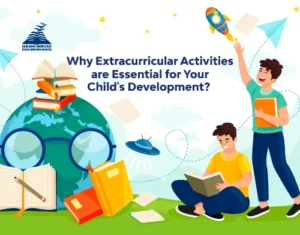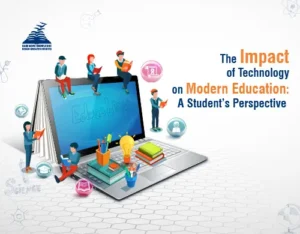The realm of education has undergone an evolution beyond the conventional focus on texts and assessments. In today’s world, having the ability to participate in critical thinking and understand intricate difficulties with the aim of implementing effective answers has become an imperative. That experience cultivates resilience and self-assurance in the decision-making capacities of children, giving them the necessary courage to manage challenges encountered throughout their lives.
In this blog, we’ll see why it is important to develop life skills in children at school.
Life skills: what are they and why are they so important?
“Life skills education” refers to the process of learning how to solve problems and analyse real-world scenarios via direct experience.
- Students who possess these competencies are better equipped to manage their responses to and strategies for resolving life’s inevitable challenges.
- These insights have the potential to inspire an optimistic outlook on life and have a beneficial effect on others around the learner.
- It helps individuals become more grounded in reality and more prepared to handle ambiguity. Those skills are called “soft skills.”
Having a strong resonance with life skills provides advantages beyond gaining admission to the best schools.
- It enhances students’ talents and fosters their development as people.
- It equips students with practical strategies and resources that will benefit them in a variety of areas, including critical thinking, interpersonal relationships, decision-making, and more.
- When all children partake in these pursuits, society becomes highly organised and well-equipped. To achieve this objective, it is crucial that students consistently apply the knowledge and skills they are acquiring in class.
Why are formative years so crucial for laying the groundwork for a lifetime of success?
Children’s academic, professional, and social success down the road can all benefit from their early acquisition of “life skills,” which go hand in hand with maturation and development.
- Teaching children life skills will help them concentrate and exercise self-control.
- The kids will benefit from improved communication, comprehension, and the confidence to make some decisions and form some relationships on their own.
- Enhances children’s critical thinking and encourages them to take on new tasks.
- Life skills are the process of maturation and progress and possess the potential to facilitate children’s future success in several domains, including academics, professional pursuits, and personal relationships.
- These important life skills should be taught to children so they can concentrate and develop self-control. intervention will facilitate the growth of children’s communication skills, comprehension abilities, and capacity to make informed decisions and establish autonomous social connections.
- It enhances cognitive abilities related to critical thinking and facilitates the development of problem-solving skills in youngsters.
Life Skills That Every School Should Teach Their Children:
In order to be successful, every school must impart a set of life skills, and each of those life skills has its own importance. The following are skills:
Enhanced Social and Emotional Intelligence:
social and emotional skills encompass the fundamental life skills necessary for the preservation of physical and mental health, which encompass perseverance, self-control, and self-awareness. Among these abilities is the ability to identify, regulate, and respond adaptively to emotional experiences. When children develop strong social and emotional intelligence, they become better equipped to handle the complexities of adult life.
Using creative arts:
The ability to think creatively enables a person to develop new ideas and create solutions to problems. It also allows their brain to explore things and look at them in a creative way. Imagination is infused into creative thinking, and logical reasoning is not involved.
Purpose-driven education:
The traditional educational system teaches students to evaluate themselves based on their grades and test scores. However, life skills education at a tender age helps students prepare for the actual world beyond test scores. Children will discover their strengths and weaknesses relatively early in life as a result of school-based skill development. Instead of focusing solely on passing examinations and earning high grades in the short term, they will study with a specific objective in mind.
Critical Thinking and Problem Solving:
Problem-solving is a life skill that involves systematically identifying and analysing an issue, developing possible solutions, critically assessing these solutions to determine the most effective solution, and subsequently applying this solution as soon as possible. As a result, regular practice of this ability is considered essential in daily life.
Communication skills:
It is impossible to express your ideas and make people understand them without proper communication, which can be achieved by developing effective communication skills. In addition to developing confidence in people, it also develops good communication skills, which help them in the professional environment.
Interpersonal Skills:
An individual’s interpersonal skills are essentially social and interaction skills. It prepares them to communicate socially, either in person or in a group. These skills include traits such as self-confidence, critical thinking, communication skills, active listening, leadership, etc. It is essential to have a positive attitude in order to develop interpersonal skills. Interpersonal skills are basically social skills and interaction skills.
Resilience and Adaptability:
In today’s rapidly changing world, adaptability is a vital trait. By teaching children to embrace change and bounce back from setbacks, schools empower them to face adversity with resilience and determination. This skill set becomes particularly crucial as they transition into higher education and the workforce.
Conclusion
Adaptability, communication, and teamwork are increasingly valued in the modern environment, elevating the significance of life skills education. Life skills education teaches students how to navigate the world and make wise decisions in their everyday lives. Problem-solving, self-advocacy, emotional intelligence, financial literacy, critical reasoning, and decision-making abilities are taught. All of these skills are essential for post-school success, and a well-rounded education should include instruction in life skills.
By investing in the holistic development of our children, we are shaping a future generation that is equipped to thrive in a rapidly changing world.






